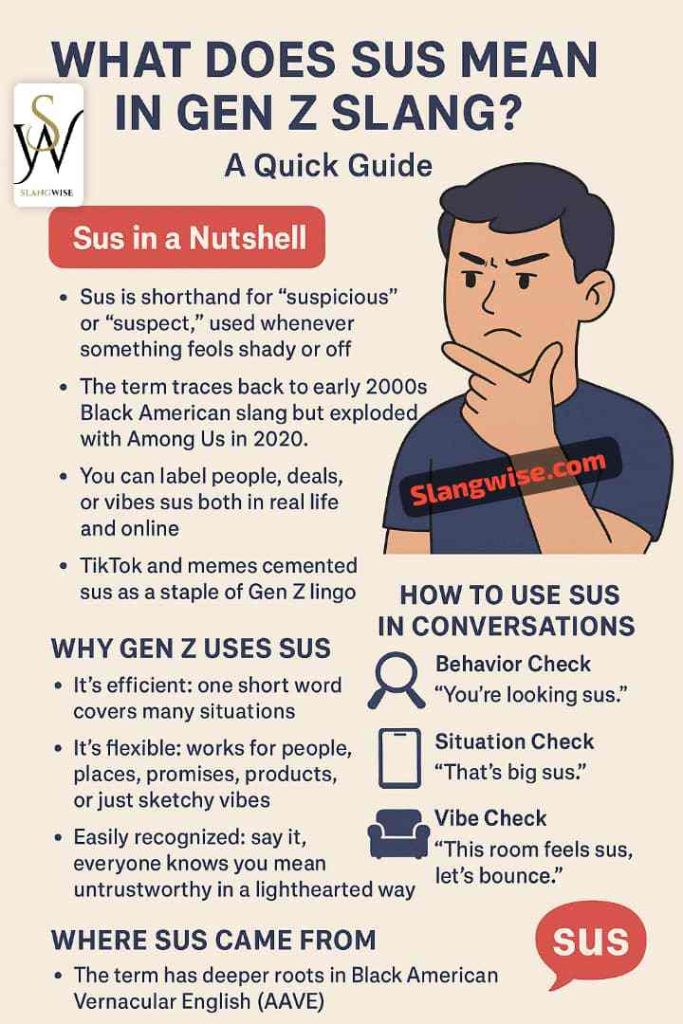Ever heard someone call a situation sus? If you’ve spent any time online, in memes, or around younger people lately, you’ve probably encountered this tiny word packing a massive punch.
Born in gaming culture, supercharged by social media, and now ubiquitous in everyday Gen Z slang, sus is the ultimate shortcut for expressing skepticism.
But what exactly does sus mean in slang, and how did it explode? This quick guide cuts through the noise to decode the origins, evolution, and proper usage of this essential piece of modern lingo.

Table of Contents
Sus Meaning in a Nutshell
- Sus is shorthand for “suspicious” or “suspect,” used whenever something feels shady or off.
- The term traces back to early 2000s Black American slang but exploded with Among Us in 2020.
- You can label people, deals, or vibes sus both in real life and online.
- TikTok and memes cemented sus as a staple of Gen Z lingo.
- Tone matters: stretch “suuuuus” for humor; keep it short for genuine suspicion.
What SUS Really Mean in Slang
Simply, sus is shorthand for “suspicious” or “suspect.” It’s like your gut saying, “Something’s off here,” but way more casual.
For me and many others, “sus” can describe anything from weird behavior at a party to an online deal that looks too good to be true.
Slangwise Tip: When you call something sus, your tone matters. A playful “You’re being so suuuus” between friends feels different than a dead-serious “That’s sus.” Match your delivery to the vibe.
Why Gen Zs uses the slang SUS
- It’s efficient. It’s ine short word covers so many situations, no elaborate explanation needed.
- It’s flexible. It works for people, places, promises, products, or just sketchy vibes.
- It’s Easily recognized. Once you say it, everyone knows you mean untrustworthy in a lighthearted way.
How to use Sus in conversations
Sus works for people, situations, promises, or just odd vibes, IRL or online. And because sus is short and punchy, you can drop it into almost any casual context:
- Behavior Check:
- If someone is lurking in corners or hiding something, you might say, “You’re looking sus.”
- Situation Check:
- When a deal seems sketchy, like selling Gucci for $10, you’d text, “That’s big sus.”
- Vibe Check:
- Even weird silence or off energy can earn a “sus” label: “This room feels sus, let’s bounce.”
ISTG is yet another interesting slang abbreviations that people use online these days. What does ISTG really mean in slang?
Where Sus Came From
Sus didn’t just appear in 2020, it has deeper roots that dated back to 19th century British police reports as far back as 1826. About 200 years later, it appears in the Black American Vernacular English (AAVE). In the early 2000s, people in urban communities began shortening suspicious to sus in everyday speech and hip-hop lyrics.
But it wasn’t until a certain indie game exploded that sus became a worldwide sensation.
The Among Us Effect
In 2020, when I was stuck at home like everyone else, Among Us became my go-to way to hang out with friends online. If you haven’t played, here’s the gist:
- You and a group are “crewmates” on a spaceship.
- One (or more) of you is an “impostor” trying to sabotage the mission.
- Everyone watches each other like hawks, yelling, “You’re sus!” whenever someone does something odd, like faking a task or hanging out in the wrong room.
Streamers like Sodapoppin and YouTubers like Corpse Husband kept calling players “sus,” and suddenly everyone on Twitch, YouTube, and TikTok was spamming that word.
Even people who never played the game heard “sus” and adopted it to call out anything suspicious in daily life.
READ ALSO: What Does Cap and No Cap Mean in Gen Z Slang – A brief overview
Examples of Sus in Real Life
Sus is so versatile that it fits any casual scenario. Here are a few ways to use it:
- Why is she texting in the bathroom? That’s sus behavior.
- She’s suddenly super clingy and then ghosted me for two days, really sus.
- A seller offering a MacBook for $100 is big sus.
You get the idea: sus is the quick call-out for anything that feels off.
Final Thought
In Short, sus is simply Gen Z’s shorthand for “suspicious.” Born in gaming culture and supercharged by Among Us, it’s become the go-to term for calling out anything sketchy, weird, or untrustworthy.
So just in case you’re online or IRL, if something feels off, it’s “sus.” Now you’re in the know!

